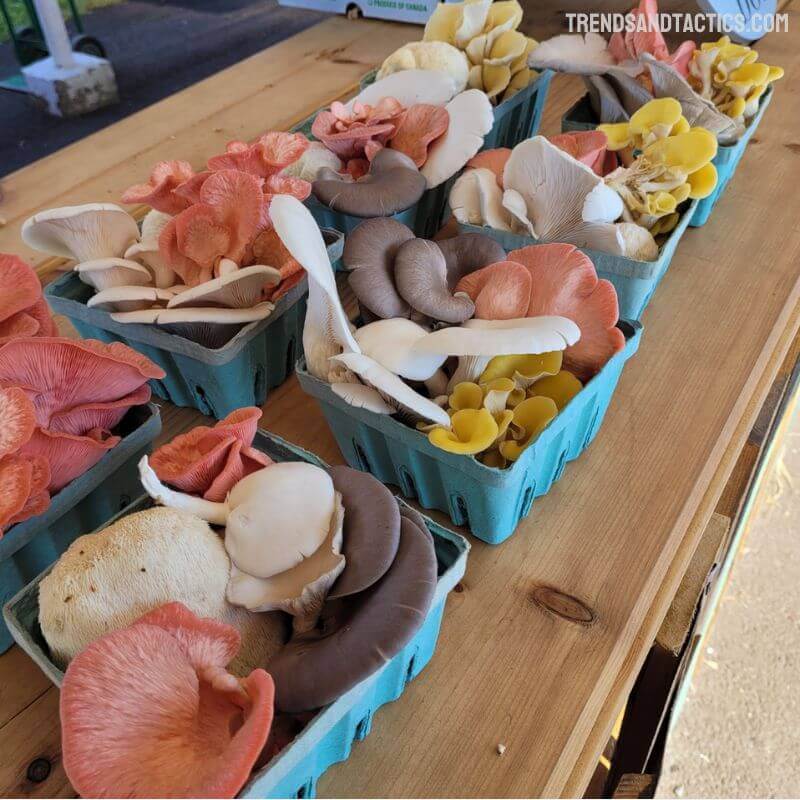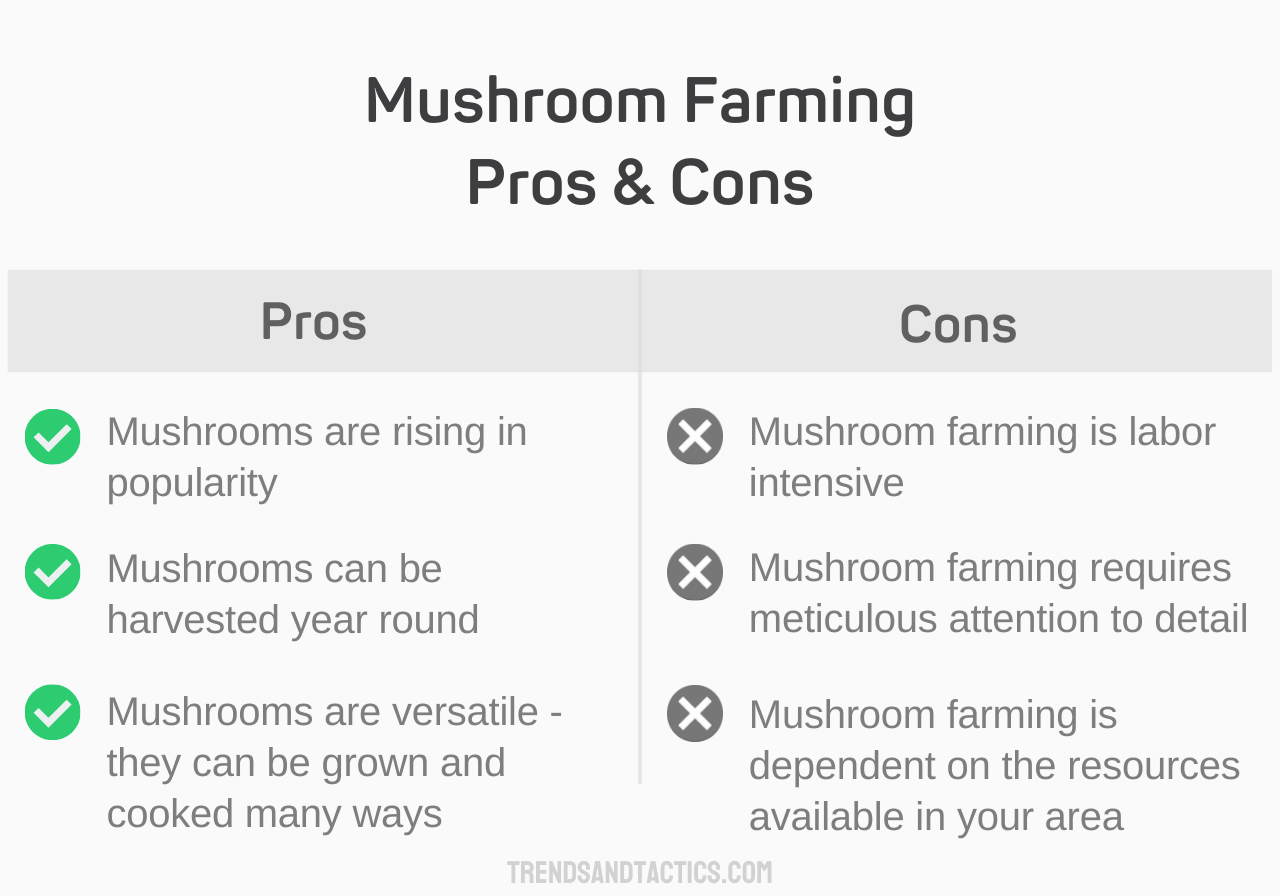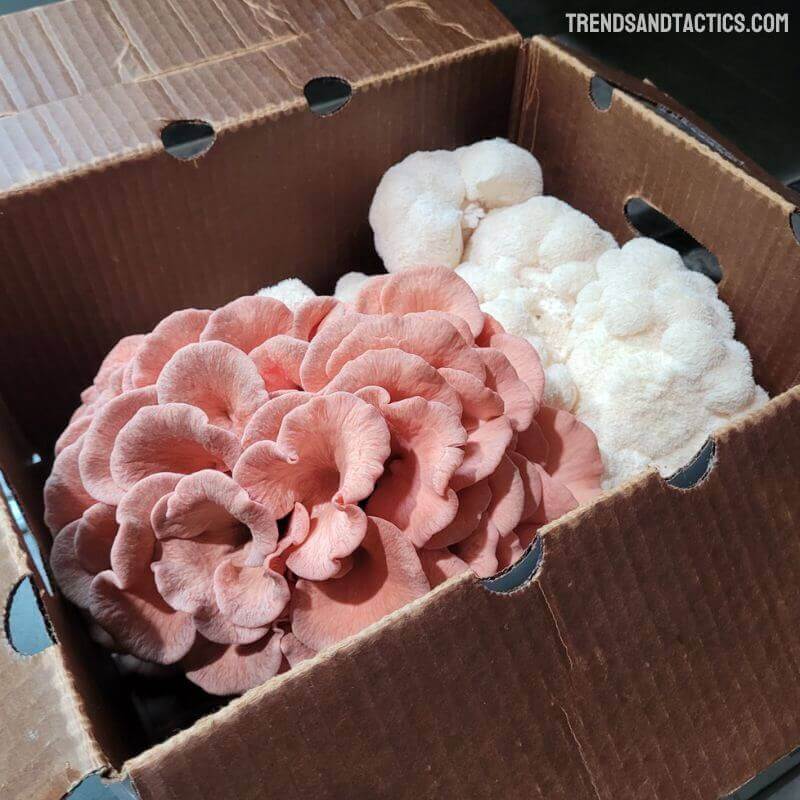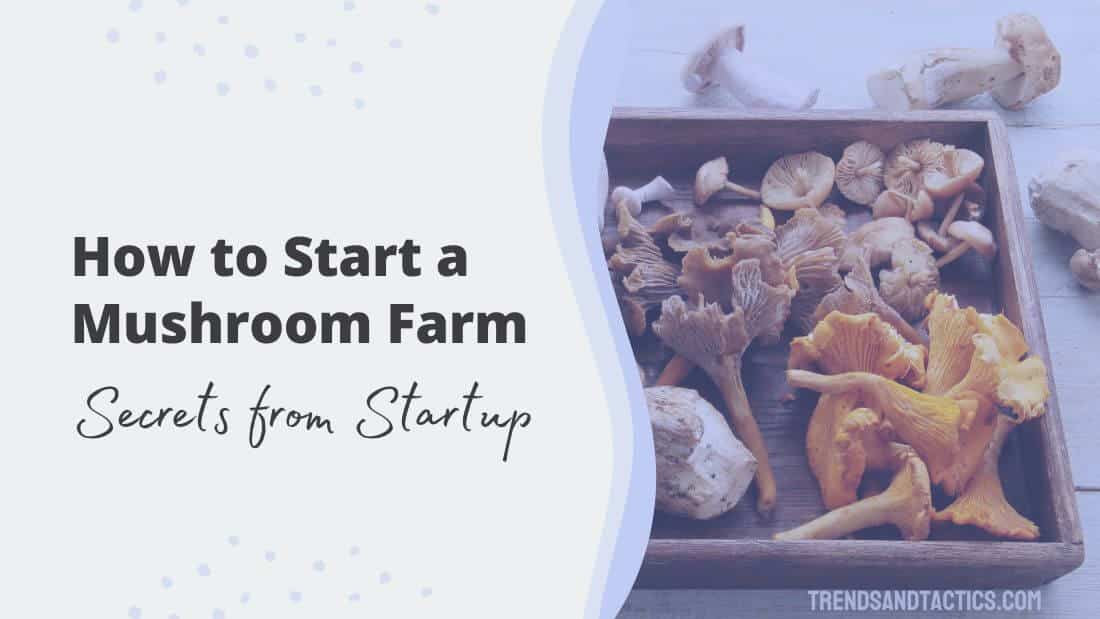Hunter Vargo is a 19 year old mushroom farmer who has an unlikely story that led him to own and operate his own mushroom farm, Mountain View Mushrooms, while he was still in high school.
His passion for mushrooms was ignited when he tried out a mushroom grow kit from Walmart during the beginning of the Pandemic in 2020.
Since then, he’s grown to supply his home-grown mushrooms to 8 local restaurants and 2 farmers markets near Hawley, Pennsylvania.
Is mushroom farming worth it?

Cultivating mushrooms from home and making a profit doing it. Does this sound like a dream to you?
Do you want to try your hand at mushroom farming? You’re not alone.
Hunter says that the number of people interested in mushroom farming (and consumption) has started to grow over the past few years.
Grow kits like the one Hunter used are on the rise, helping all of us enjoy mushroom growing as a hobby.
This requires several essential steps, like planning out a growing strategy, gathering necessary materials, and finally starting to grow your product from scratch, which Hunter claims can be quite finicky.
When you find your stride and learn how to start a successful farm, you might be surprised like Hunter was at the number of establishments that are looking to purchase locally grown mushrooms, and how lucrative this niche can be.
Hunter is willing to share the secrets to his success as a mushroom farmer and the tips he’s picked up along the way so you can learn how to start mushroom farming on your own.
Why Start a Mushroom Farm
The medicinal and culinary properties of mushrooms are getting more and more buzz these days. Vegans, the health conscious, and foodies alike are starting to tap into the glorious world of mushroom consumption.
Trend on the Rise
Mushrooms are now being used as an ingredient in supplements, Hunter points out. Their medicinal properties are being honed in the pharmaceutical world, and mushroom farmers can offer their crop to be used in this way. Whether it be a vitamin gummy or a healthy dog treat, your mushrooms can provide a consumer with their awesome health benefits. Who knew you could earn money from a biochemistry degree with mushrooms!
Hunter points out that mushrooms have an extremely versatile structure, meaning they can be infused with flavor, plated beautifully, and even used as a hearty substitute for meat (a popular dish among vegan chefs starting a food truck business).
As the demand for these delicious and healthy fungi grows, so does the need for mushroom farmers.
Because of the versatility of the mushroom, Hunter says they are easily marketed and sold to the right customers. The market is competitive, but the product sells itself.
Why grow mushrooms?
Here’s just a few reasons Hunter gives us for growing mushrooms instead of trying your hand at another kind of produce:

How do I start a mushroom farm?
Now that you’re on board with starting your own farm, where do you begin?
Just like any other startup, mushroom farming requires making a business plan, gathering the materials you’ll need, starting your business, and getting your first customer.
Tactic for Success
Find a mentor before you start farming! Hunter highly recommends talking to a veteran mushroom farmer. He says many are approachable and willing to share their passion and expertise. This one-on-one mentorship will protect you from making common and expensive mistakes as you start your farm.
Mushroom Farming Business Plan
How much time do you have to give to this new endeavor? Do you have funds saved up to cover costs?
These details will be specific to your situation, but be sure to include them in your business plan and figure out if this is a business you can start with 10k, or if more investment is needed.

Hunter started his mushroom farm in high school as a side-gig. He decided to defer going to college and make his mushroom business full time!
Now he’s building a plan to continue growing and offering his product to more customers in the next few years. He says “I’ll keep doing this for as long as I can!”
Trend on the Rise
Farmers trying to grow more species of lesser known and more exotic mushrooms is a trend Hunter is noting of late. He says that with the right resources, growers can be successful with these rarer types of mushrooms.
The future of mushroom farming seems promising, so take it from Hunter and plan out your next step as a mushroom farmer.
Here are some tips Hunter gives to make the most of your planning phase before starting your farm.
Before you start growing:
- Have a Detailed Plan – A schedule for doing lab work to test the mushrooms, clean the area they are grown in, and maintain a constant temperature is necessary for success, says Hunter.
- Ask a Seasoned Expert – To avoid many common pitfalls, Hunter recommends seeking out a current mushroom farmer to get their take on best practices for the species you want to grow.
- Gather Your Materials – Since mushroom farming is such a science, it’s important to have everything you need on hand before beginning.
Do mushroom farms make money?
Due to the many options for growing, cooking, and using mushrooms for health benefits, they are rising in value from the growing demand for their awesome properties.
Hunter encourages that he has been pleasantly surprised at the willingness to purchase his home-grown mushrooms, and he didn’t foresee his hobby becoming this lucrative.
Rest assured, mushroom farming can become a profitable business.
Tactic for Success
Be generous! Hunter says that one of his best moves as a business owner has been giving away his product to interested customers. He says it usually pays off with a sale, and it can be a great way to make an initial connection and gain a longtime customer.
Cost of Starting a Mushroom Farm

Speaking of making money, there’s always the question of how much it will cost to break even, or start becoming profitable as a new business.
To make sure you’re not losing money on valuable materials you bought, Hunter recommends doing your homework before starting anything.
Save Money Where You Can
“Use free online resources!” Hunter encourages new farmers to use YouTube as a launchpad for their business, as much of the information needed to start successfully growing mushrooms can be found on YouTube within minutes.
Starting a business can be expensive, but educating yourself for free can help cut costs.
Be Prepared to Put in Work
“Make sure you’re ready to clean, work and plan,” he says.
If you’re interested in starting your own mushroom farm, be ready to meticulously clean, plan and track your crop.
Hunter says it’s crucial to a successful mushroom harvest that the grower is spot-on with lab work and tracking different factors that might affect the mushroom growth.
“You’re dealing with another living thing, so you have to keep it alive 24/7!” Hunter cautions.
If you aren’t a detail-oriented person, mushroom farming might not be for you. There are plenty of easy businesses to start from home that could be worth considering.
Staying up on cleaning and testing your crop can make the difference between losing the investment you made in your farm and getting no income, and having a successful harvest and making the profit you want.
He also lets us know that it’s pretty labor intensive. If you have any health issues that prevent you from doing regular manual labor, mushroom farming might not be the best choice for you.
If you’re looking to purchase some products to start your farm out right, here are the materials you’ll probably need, depending on the mushroom species you decide to grow first.
What materials do I need to start growing mushrooms?
- Mushroom Substrate – The surface on which the mushroom will grow (think straw, coffee grounds or even cardboard)
- Cleaning Materials – Hunter informs us that cleaning is a big part of mushroom farming.
- A Flow Hood – This filtering fan is necessary for making sure you’ll only grow the mushrooms you intend.
- A Controlled Temperature Environment – Hunter says most mushrooms species can grow in temperatures between 50 and 80 degrees Fahrenheit
Even with the costs of these materials, the versatility and marketability of mushrooms lends to a lucrative business.
Investing in your mushroom-growing space, your materials, and giving your time to this craft can pay off in the long run.
Now, Hunter says he sources his own substrate, so with experience and time you can save money by recycling materials and utilizing resources you already have at your disposal.
Wrapping Up
Even as a mushroom farmer living near huge competition, the mushroom capital of the world, Kennett Square, Hunter Vargo encourages that anyone can start mushroom farming with the right education and tools.
Try your hand at mushroom farming and you could find yourself selling your product to local restaurants and happy customers!
Brenna is a finance guru who enjoys writing about entrepreneurial opportunities and personal finance tips. She graduated from Liberty University with a bachelors degree in business and now helps small businesses market their products as a digital marketing consultant.






